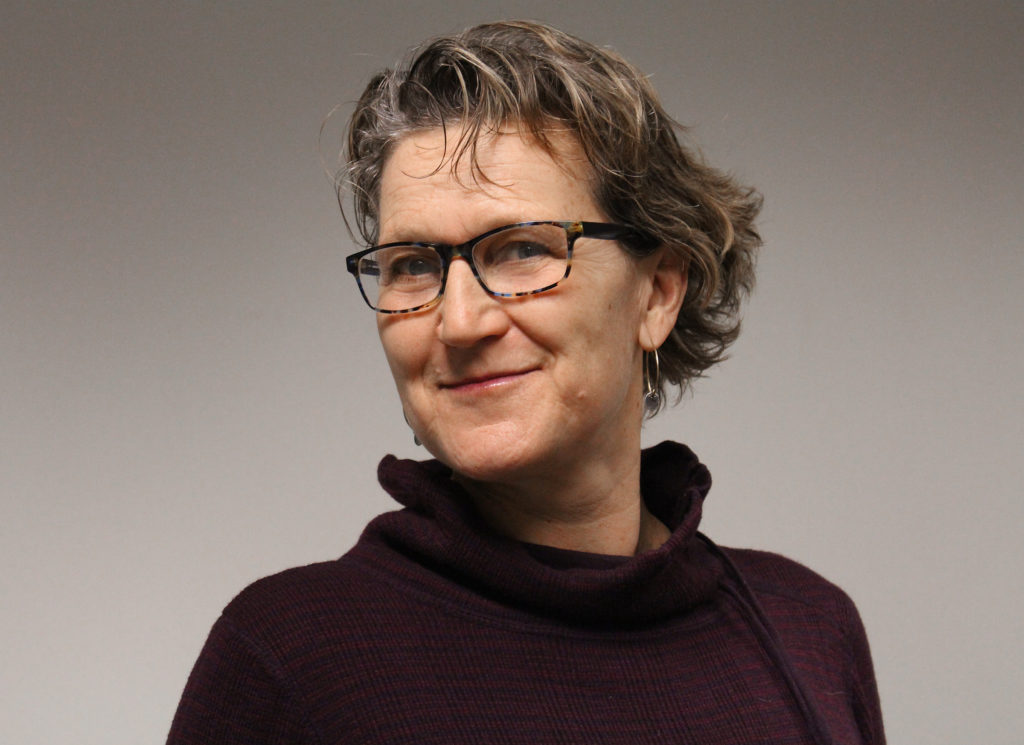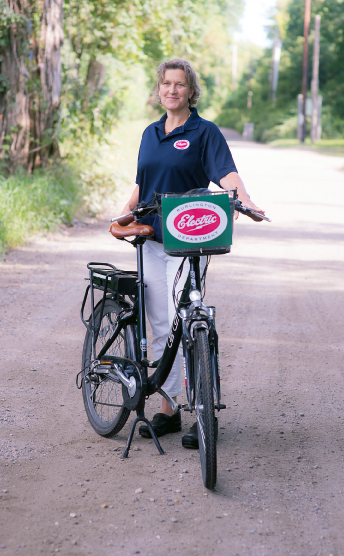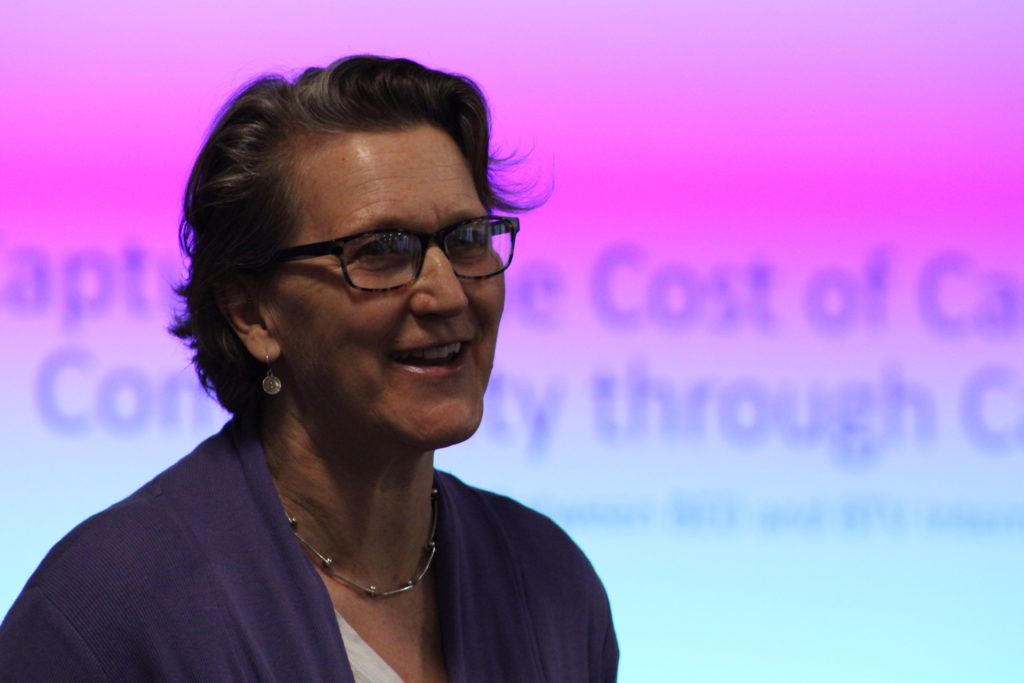
Jennifer Green’s first foray into distance biking was when she and her husband biked across the country after finishing grad school. Although Jennifer bikes to work, and loves her longer weekend rides, the itch to do another substantial, multi-day ride was rekindled on a recent trip to San Diego. Watching riders come down Highway 101, Jennifer committed to another audacious multi-day ride.
Her husband Keith was less enamored. So Jennifer decided to look for an option she could do alone. As many of us do when looking for something new, Jennifer turned to Google. She found Climate Ride, and after reading over the website and making some calls to verify the credibility of the organization, signed up. Not only would it scratch the multi-day bike ride itch, it would allow Jennifer to raise money for a non-profit near to her heart. “Why just ride when you can ride for good?”
Committed to sustainability in a model city

Climate Ride is a perfect fit for Jennifer. As the city of Burlington, Vermont’s Sustainability Officer, Jennifer has made a career out of trying to mitigate the climate crisis. Jennifer was an author of city’s climate action plan and is now working to transition the city to net-zero energy in the thermal and transportation sectors, building on Burlington’s stats as the first city in the country to source
100% of its electricity from renewables.
Jennifer works hard to come up with and institute creative ideas to help make the city sustainable. Jennifer and the city’s team recently implemented
an electric bike program to encourage people to use e-bikes instead of cars and is working with credit unions to help people of low and moderate income participate.
Jennifer has also seen firsthand how climate change impacts the region. Burlington sits on the edge of Lake Champlain and
the increased rainfall has threatened the health of the lake as the wastewater infrastructure simply cannot handle the volume of water from extreme weather events.
According to the
Vermont state website, increased rain and flooding aren’t just a problem for Burlington. The whole state is experiencing more intense storms and increased damage from floods. Long a destination for east coast skiing, shifting weather patterns have started to push snow to the south, which is concerning for Vermont’s ski industry. Maple sugaring has also taken a hit due to a shorter and less predictable tapping season, which the
Vermont Agency of Natural Resources reports makes the crop more difficult to harvest.
To help ease the impact of climate change on Vermont, Jennifer is riding for the
Vermont Green Building Network (VGBN). They manage
Burlington’s 2030 district, a project which, according to their mission statement, aims to “reduce building energy consumption, water use and transportation emissions 50% by 2030. By establishing the economic case for these reductions, we help property owners increase asset value, reduce operating costs, and create a healthier community.” Jennifer is hoping that more people will join Climate Ride and select the Vermont Green Building Network as a beneficiary.
The costs and benefits of pedaling for the planet
Traveling all the way from Vermont to participate in Climate Ride California has been a concern for Jennifer, as it is for many people who are not local to the Climate Ride event they wish to participate in. Rationally, Jennifer worries that the amount of fossil fuel it takes to get her across the country is counterproductive to the purpose of the ride. Like many riders, Jennifer plans to offset her travel (she’ll be using
United’s Carbon Offset plan) but knows that doesn’t fully cut it when it comes reducing our impact to help the planet. As a side note, Climate Ride offsets the approximate emissions for every event, from support vehicles to staff travel, through
Clear Sky Climate Solutions.
In weighing the costs and the benefits, Jennifer leans towards joining the ride in the hopes that meeting and sharing ideas and inspiration with this proactive and committed community will do more to move and motivate all of us as a united front. She’ll be bringing her extensive knowledge to share, so be sure to take a moment and pick her brain about how to model your own city after Burlington’s success!
Especially in recent years and in view of current
US policies on environmental regulations, feelings of hopelessness and burnout are a real concern for the fight against climate change.
Gillian Caldwell’s tips are even more needed now than they were in 2010. Many people find that Climate Ride can be what Jennifer described as a kind of antidote to climate sadness–a way for all of us who care about the future of our planet, about wilderness, about the health of our grandchildren and their grandchildren, to come together and see one another and be reinvigorated in our efforts. Jennifer points out that as long as we aren’t simply patting ourselves on the back, but actually using events like Climate Ride to bolster our efforts, it is probably worth an offset plane trip or two.
George Monbiot, author of
Feral, puts it well in pointing out that it comes down to maintaining our hope in order to maintain our action. Monbiot writes, “In motivating people to love and defend the natural world, an ounce of hope is worth a ton of despair.”

 Jennifer Green’s first foray into distance biking was when she and her husband biked across the country after finishing grad school. Although Jennifer bikes to work, and loves her longer weekend rides, the itch to do another substantial, multi-day ride was rekindled on a recent trip to San Diego. Watching riders come down Highway 101, Jennifer committed to another audacious multi-day ride.
Her husband Keith was less enamored. So Jennifer decided to look for an option she could do alone. As many of us do when looking for something new, Jennifer turned to Google. She found Climate Ride, and after reading over the website and making some calls to verify the credibility of the organization, signed up. Not only would it scratch the multi-day bike ride itch, it would allow Jennifer to raise money for a non-profit near to her heart. “Why just ride when you can ride for good?”
Jennifer Green’s first foray into distance biking was when she and her husband biked across the country after finishing grad school. Although Jennifer bikes to work, and loves her longer weekend rides, the itch to do another substantial, multi-day ride was rekindled on a recent trip to San Diego. Watching riders come down Highway 101, Jennifer committed to another audacious multi-day ride.
Her husband Keith was less enamored. So Jennifer decided to look for an option she could do alone. As many of us do when looking for something new, Jennifer turned to Google. She found Climate Ride, and after reading over the website and making some calls to verify the credibility of the organization, signed up. Not only would it scratch the multi-day bike ride itch, it would allow Jennifer to raise money for a non-profit near to her heart. “Why just ride when you can ride for good?”
 Climate Ride is a perfect fit for Jennifer. As the city of Burlington, Vermont’s Sustainability Officer, Jennifer has made a career out of trying to mitigate the climate crisis. Jennifer was an author of city’s climate action plan and is now working to transition the city to net-zero energy in the thermal and transportation sectors, building on Burlington’s stats as the first city in the country to source 100% of its electricity from renewables.
Jennifer works hard to come up with and institute creative ideas to help make the city sustainable. Jennifer and the city’s team recently implemented an electric bike program to encourage people to use e-bikes instead of cars and is working with credit unions to help people of low and moderate income participate.
Jennifer has also seen firsthand how climate change impacts the region. Burlington sits on the edge of Lake Champlain and the increased rainfall has threatened the health of the lake as the wastewater infrastructure simply cannot handle the volume of water from extreme weather events.
According to the Vermont state website, increased rain and flooding aren’t just a problem for Burlington. The whole state is experiencing more intense storms and increased damage from floods. Long a destination for east coast skiing, shifting weather patterns have started to push snow to the south, which is concerning for Vermont’s ski industry. Maple sugaring has also taken a hit due to a shorter and less predictable tapping season, which the Vermont Agency of Natural Resources reports makes the crop more difficult to harvest.
To help ease the impact of climate change on Vermont, Jennifer is riding for the Vermont Green Building Network (VGBN). They manage Burlington’s 2030 district, a project which, according to their mission statement, aims to “reduce building energy consumption, water use and transportation emissions 50% by 2030. By establishing the economic case for these reductions, we help property owners increase asset value, reduce operating costs, and create a healthier community.” Jennifer is hoping that more people will join Climate Ride and select the Vermont Green Building Network as a beneficiary.
Climate Ride is a perfect fit for Jennifer. As the city of Burlington, Vermont’s Sustainability Officer, Jennifer has made a career out of trying to mitigate the climate crisis. Jennifer was an author of city’s climate action plan and is now working to transition the city to net-zero energy in the thermal and transportation sectors, building on Burlington’s stats as the first city in the country to source 100% of its electricity from renewables.
Jennifer works hard to come up with and institute creative ideas to help make the city sustainable. Jennifer and the city’s team recently implemented an electric bike program to encourage people to use e-bikes instead of cars and is working with credit unions to help people of low and moderate income participate.
Jennifer has also seen firsthand how climate change impacts the region. Burlington sits on the edge of Lake Champlain and the increased rainfall has threatened the health of the lake as the wastewater infrastructure simply cannot handle the volume of water from extreme weather events.
According to the Vermont state website, increased rain and flooding aren’t just a problem for Burlington. The whole state is experiencing more intense storms and increased damage from floods. Long a destination for east coast skiing, shifting weather patterns have started to push snow to the south, which is concerning for Vermont’s ski industry. Maple sugaring has also taken a hit due to a shorter and less predictable tapping season, which the Vermont Agency of Natural Resources reports makes the crop more difficult to harvest.
To help ease the impact of climate change on Vermont, Jennifer is riding for the Vermont Green Building Network (VGBN). They manage Burlington’s 2030 district, a project which, according to their mission statement, aims to “reduce building energy consumption, water use and transportation emissions 50% by 2030. By establishing the economic case for these reductions, we help property owners increase asset value, reduce operating costs, and create a healthier community.” Jennifer is hoping that more people will join Climate Ride and select the Vermont Green Building Network as a beneficiary.
